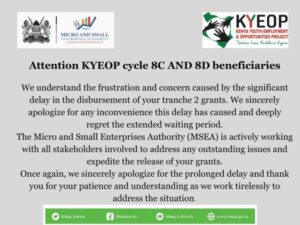KYEOP Cycle 8C and 8D Beneficiaries: Current Information Regarding KYEOP Cycle 8C and 8D Recipients Beneficiaries of KYEOP cycles 8C and 8D, take note.We recognize that the considerable delay in the payment of your tranche 2 grants has left you feeling frustrated and anxious.
We regret the longer waiting period and we apologize for any trouble this delay may have caused.
The Micro and Small Enterprises Authority (MSEA) is actively working with all stakeholders involved to address any outstanding issues and expedite the release of your grants.
Once again, we sincerely apologize for the prolonged delay and thank you for your patience and understanding as we work tirelessly to address the situation.
Msea_Kenya Mseakenya Msea Authority www.msea.go.ke
ABOUT
Kenya Youth Employment and Opportunities Project (KYEOP) is a transformational project that aims to empower and uplift the well-being of the youth in Kenya by equipping them with essential training, internship and business grant opportunities. The development objective of KYEOP is to increase employment and earning opportunities among targeted young people across Kenya. The project aims to reach over 280,000 youth during the project period in urban and rural areas in the following 17 implementing counties; Nairobi, Mombasa, Kisumu, Nakuru, Kwale, Kitui, Migori, Turkana, Kiambu, Kakamega, Kilifi, Nyandarua, Mandera, Machakos, Kisii, Bungoma and Wajir.
The main beneficiaries of the project are youth between 18-29 years of age (with some component extending up to 35 years) who are jobless and have experienced extended spells of unemployment or who are currently working in vulnerable jobs. The level of education of targeted beneficiaries will be up to Form 4.
The project has 4 components that are being implemented by different Government Agencies as follows:
- Component 1: Improving youth employability, implemented by MIIYA and the National Industrial Training Authority (NITA)
- Component 2: Support for job Creation, implemented by the Micro and Small Enterprises Authority (MSEA)
- Component 3: Improving Labour Market Information, implemented by the Ministry of Labour and Social Protection
- Component 4: Strengthening Youth Policy Development and project management, implemented by the State Department for Youth, in the Ministry of ICT, Innovation and Youth Affairs (MIIYA).
The Micro and Small Enterprises Authority (MSEA) is implementing the component on Support for Job Creation through provision of business start-up grants and Business Development Services training to vulnerable youth aged between 18-29 years. The component addresses key constraints and market failures that limit the demand for youth employment and their productivity once in employment. These are:
- Lack of start-up financing for young entrepreneurs;
- Lack of managerial and entrepreneurial skills among youth;
- Lack of relevant exposure and networks for starting and growing a business among youth.
Support for job Creation responds to the need for job creation with initiatives to help;
- Launch new businesses
- Improve the productivity and job creation potential of existing micro-enterprises and among self-employed youth
- Support innovative approaches to improving job and earning opportunities among the hard-to-reach youth.
This component aims at assisting youth in Kenya to acquire the skills and capital required to help them in generating an income as an Entrepreneur “Mfanyabiashara”.
There are two subcomponents to it:
assistance for independent contractors offers grants and business development services (BDS) to young people who are running their own businesses or who aspire to start one.
Interventions with a catalyst to create jobs encourages creative approaches to employment creation for young people in specified areas by funding business plan competitions aimed at promising young entrepreneurs.
Youths can invest in businesses with Kes. 40,000 in seed money thanks to company start-up grants. 69,069 young people have benefited from the scheme thus far by receiving awards totaling Ksh. 2.7 billion. By the project’s conclusion, MSEA will have given 78,000 youth about Kes 2.8 billion.
88% of the young people who received the grant have launched or grown their businesses, according to employment tracking. Of the 88%, 46% had hired young people from the same target group. Following the grant, which showed a drop in the percentage of the population under observation with no income from 25.9% to 7.3%, there has been a significant improvement in the income levels of young people. Women were up 49% of Grant and BDS recipients.
30,000 young people were the initial objective for company start-up incentives. But because of the outstanding results obtained under this sub-component, the savings from other agency-wide improvements were included to raise the target to 78,000 kids throughout the 17 participating counties.
Training in Business Development Services
The purpose of the Business Development Services training (BDS) sub-component 2.2 is to assist young people in Kenya in developing the managerial and entrepreneurial skills necessary to expand their businesses.
The training was given in a four-day classroom setting, over the course of three coaching sessions or four days of field visits to the youth’s place of business. After the Covid-19 pandemic, the short-term, in-person proactive business counseling was replaced with digital BDS training.
9,384 young people have received business development training to date, either through coaching, classroom instruction, or both. An extra 64,482 young people have gotten BDS instruction digitally, via SMS. After the intervention, 81% of BDS beneficiaries had gainful employment six months later.









